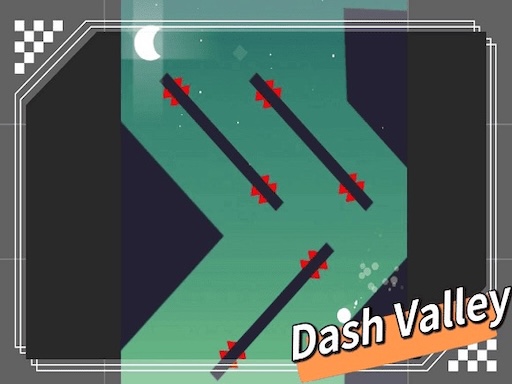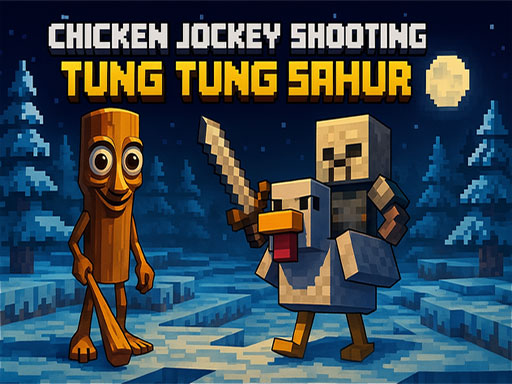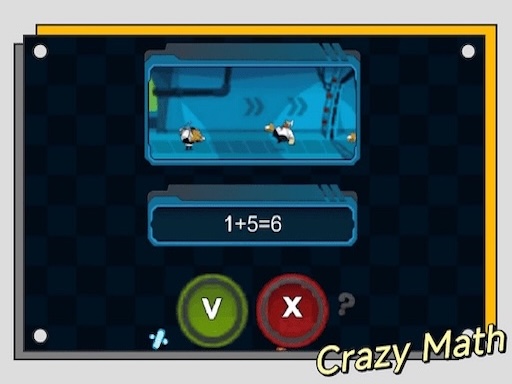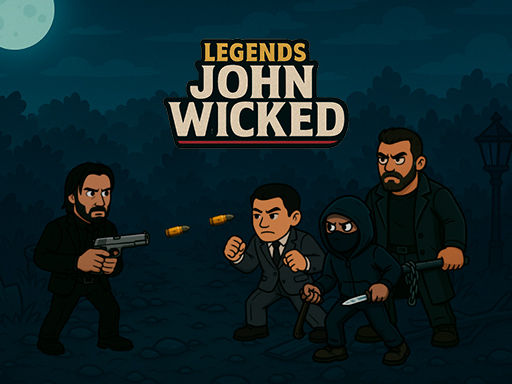Resident Evil: Bio-Warfare
About Resident Evil: Bio-Warfare
Okay, so listen, you know how sometimes you stumble across a game, almost by accident, and it just… *clicks*? Like, it grabs you by the collar and doesn't let go until you've seen the credits roll, and even then, you're still thinking about it? That’s exactly what happened to me with *Resident Evil: Bio-Warfare*. I mean, I’ve played a ton of shooters, a ton of survival horror, but this one? This one feels different. It’s got that raw, visceral tension that I honestly haven’t felt in a game in ages, and I just *have* to tell you about it.
Picture this: the world is a mess. Not just a little messy, but full-blown, teetering-on-the-brink-of-collapse kind of mess, thanks to some global tariff war that’s spiraled completely out of control. Resources are scarce, nations are hostile, and the air just feels thick with desperation. You can almost taste the fear, the uncertainty, in every news report you hear, every empty shelf you see. It’s a genuinely bleak backdrop, and it immediately sets a tone that makes you feel like the stakes couldn't possibly get any higher. And then, they do. The President of the free world, the one person who could potentially pull us back from the edge, gets abducted. Not just kidnapped, mind you, but spirited away by a hostile nation to some top-secret bio-lab, for what they’re calling "unspeakable experiments." Just the phrase "unspeakable experiments" sends shivers down your spine, doesn't it? It’s not just about a political leader; it’s about the symbol, the hope, being twisted into something monstrous.
That’s where *you* come in. You’re a former special ops agent, which immediately tells you a lot about your character without needing a twenty-minute cutscene. You’re tough, you’re resourceful, you’ve seen things. But even for someone like you, this mission feels different. It’s not just another black ops extraction; it’s a desperate, almost suicidal plunge deep into enemy territory, completely alone, with the fate of the world literally resting on your shoulders. The weight of that responsibility, the sheer isolation of being the last hope, it’s palpable from the moment the game starts. You feel it in the way your character moves, in the grim determination in their posture. What I love about games like this is how they manage to make you feel like a one-person army, but also incredibly vulnerable at the same time. You’re capable, sure, but you’re also just one person against an entire hostile nation and whatever horrors they’ve cooked up.
And oh, the horrors. Once you infiltrate that lab, that’s when the game truly sinks its teeth into you. The environment itself is a character. It’s not just some generic military base; it’s a sprawling, claustrophobic maze of infected corridors. Think flickering fluorescent lights, the constant drip of unknown liquids, the unsettling silence punctuated by distant, inhuman groans. You can almost feel the damp, metallic air, the grime under your boots. The level design is just brilliant, honestly. Every corner you turn feels like a gamble. Is there a monster waiting? Is it a dead end? Or is it a hidden path that might lead to a crucial piece of information or, even better, some much-needed ammo?
Because let me tell you, "every bullet counts" isn't just a tagline here; it's the gospel. This isn't a run-and-gun shooter where you can spray and pray. You'll find yourself meticulously counting shots, weighing whether to use that precious shotgun shell on the shambling horror ahead or save it for something truly terrifying that you just *know* is coming. The combat is third-person, which I actually prefer for this kind of game because it lets you see your character’s reactions, the way they brace themselves, the subtle shifts in their stance as they aim. It adds to the immersion, making you feel more connected to their struggle. When you land a headshot and that sickening squelch echoes through the corridor, there’s a genuine sense of relief, a moment to breathe before the next threat inevitably emerges. But that relief is fleeting, because you're always checking your inventory, always scanning the environment for anything that might give you an edge.
The bio-engineered monsters, man, they are *nightmarish*. They’re not just re-skinned zombies; these are genuinely grotesque, twisted abominations that clearly started as something human or animal before being subjected to those "unspeakable experiments." Some are hulking brutes that charge with terrifying speed, others are smaller, scuttling things that swarm you, and then there are the ones that are just… *wrong*. The way they move, the sounds they make, it’s all designed to get under your skin. You’ll find yourself holding your breath, trying to anticipate their movements, trying to conserve ammo while still taking them down efficiently. There are moments when you’re cornered, low on health, and you have to make split-second decisions: do I try to fight my way out, or do I risk a desperate dash for an escape route, hoping I don't get snagged? That kind of tension, that heart-pounding urgency, is what I live for in games.
And it’s not just about shooting. The game weaves in these deadly puzzles that are just fantastic. They’re not arbitrary riddles; they’re integrated seamlessly into the lab’s environment, often requiring you to understand the facility’s twisted logic or bypass security systems that are now failing in horrific ways. You might need to reroute power, decipher cryptic notes left by panicked scientists, or manipulate machinery that’s now covered in… well, you can imagine. The satisfaction of finally figuring out a particularly tricky puzzle, that "aha!" moment when the solution clicks into place, is incredibly rewarding. It’s a brief mental reprieve from the constant threat, but even then, you’re always aware that whatever lies beyond that newly opened door could be even worse.
What's fascinating is how the game uses environmental storytelling to "uncover the truth behind the war." You’re not just told what happened; you piece it together. You find scattered documents, audio logs, grotesque experiments frozen in time, and the sheer desperation of the scientists who were forced to work on these projects. It paints a chilling picture of a world gone mad, where ethics were thrown out the window in the pursuit of power. This makes me wonder about the true cost of these global conflicts, and how far people will go when pushed to the brink. The narrative isn't just a backdrop; it’s a driving force, pushing you forward, making you *want* to know what happened, what they were trying to achieve, and how it all ties into the President’s abduction.
"Every decision matters" isn't just about combat, either. It’s about your pathfinding through the lab, the resources you choose to pick up or leave behind, and even the order in which you tackle certain objectives. Sometimes, taking a risk to explore a dangerous side path might yield a crucial upgrade or a hidden cache of supplies that saves your life later. Other times, it might lead you straight into an ambush. That constant internal debate, that weighing of risk versus reward, is what makes each playthrough feel so personal and intense. The brilliant thing about this is that it forces you to slow down, to think, to really *engage* with the world and its challenges, rather than just rushing through.
The real magic happens when all these elements coalesce. You’re navigating a dark, oppressive corridor, your flashlight beam cutting through the gloom, every creak and groan putting you on edge. You hear a distant shriek, your heart rate picks up, and you instinctively check your ammo. Then you come across a locked door, a complex panel with missing components. You know you need to find them, but you also know that searching means exposing yourself to more danger. You find a clue, solve a small part of the puzzle, and suddenly, a monster bursts through a vent above you, forcing you into a desperate fight for survival, using every last bullet you have. You barely make it out, your health in the red, but you’ve got the component you need. That feeling of triumph, mixed with sheer terror, is what this game delivers in spades.
Honestly, I’ve always been drawn to games that don’t just tell a story, but make you *feel* it, make you live through it. And *Resident Evil: Bio-Warfare* does that spectacularly. It’s not just a game; it’s an experience. It’s the adrenaline rush of a narrow escape, the satisfaction of solving a complex puzzle under immense pressure, and that chilling realization as the truth behind the experiments slowly unravels. It’s about the desperate, unwavering hope of saving the leader of the free world, knowing that if you fail, it truly *is* too late. You can almost feel the weight of the controller in your hands, hear the sounds of the lab echoing in your ears, and sense the urgency of the next challenge. If you’re looking for a third-person shooter that blends intense survival horror with a gripping, high-stakes narrative, one that will genuinely keep you on the edge of your seat from start to finish, then you absolutely, positively *have* to check this out. Trust me on this one; you won't regret it.
Picture this: the world is a mess. Not just a little messy, but full-blown, teetering-on-the-brink-of-collapse kind of mess, thanks to some global tariff war that’s spiraled completely out of control. Resources are scarce, nations are hostile, and the air just feels thick with desperation. You can almost taste the fear, the uncertainty, in every news report you hear, every empty shelf you see. It’s a genuinely bleak backdrop, and it immediately sets a tone that makes you feel like the stakes couldn't possibly get any higher. And then, they do. The President of the free world, the one person who could potentially pull us back from the edge, gets abducted. Not just kidnapped, mind you, but spirited away by a hostile nation to some top-secret bio-lab, for what they’re calling "unspeakable experiments." Just the phrase "unspeakable experiments" sends shivers down your spine, doesn't it? It’s not just about a political leader; it’s about the symbol, the hope, being twisted into something monstrous.
That’s where *you* come in. You’re a former special ops agent, which immediately tells you a lot about your character without needing a twenty-minute cutscene. You’re tough, you’re resourceful, you’ve seen things. But even for someone like you, this mission feels different. It’s not just another black ops extraction; it’s a desperate, almost suicidal plunge deep into enemy territory, completely alone, with the fate of the world literally resting on your shoulders. The weight of that responsibility, the sheer isolation of being the last hope, it’s palpable from the moment the game starts. You feel it in the way your character moves, in the grim determination in their posture. What I love about games like this is how they manage to make you feel like a one-person army, but also incredibly vulnerable at the same time. You’re capable, sure, but you’re also just one person against an entire hostile nation and whatever horrors they’ve cooked up.
And oh, the horrors. Once you infiltrate that lab, that’s when the game truly sinks its teeth into you. The environment itself is a character. It’s not just some generic military base; it’s a sprawling, claustrophobic maze of infected corridors. Think flickering fluorescent lights, the constant drip of unknown liquids, the unsettling silence punctuated by distant, inhuman groans. You can almost feel the damp, metallic air, the grime under your boots. The level design is just brilliant, honestly. Every corner you turn feels like a gamble. Is there a monster waiting? Is it a dead end? Or is it a hidden path that might lead to a crucial piece of information or, even better, some much-needed ammo?
Because let me tell you, "every bullet counts" isn't just a tagline here; it's the gospel. This isn't a run-and-gun shooter where you can spray and pray. You'll find yourself meticulously counting shots, weighing whether to use that precious shotgun shell on the shambling horror ahead or save it for something truly terrifying that you just *know* is coming. The combat is third-person, which I actually prefer for this kind of game because it lets you see your character’s reactions, the way they brace themselves, the subtle shifts in their stance as they aim. It adds to the immersion, making you feel more connected to their struggle. When you land a headshot and that sickening squelch echoes through the corridor, there’s a genuine sense of relief, a moment to breathe before the next threat inevitably emerges. But that relief is fleeting, because you're always checking your inventory, always scanning the environment for anything that might give you an edge.
The bio-engineered monsters, man, they are *nightmarish*. They’re not just re-skinned zombies; these are genuinely grotesque, twisted abominations that clearly started as something human or animal before being subjected to those "unspeakable experiments." Some are hulking brutes that charge with terrifying speed, others are smaller, scuttling things that swarm you, and then there are the ones that are just… *wrong*. The way they move, the sounds they make, it’s all designed to get under your skin. You’ll find yourself holding your breath, trying to anticipate their movements, trying to conserve ammo while still taking them down efficiently. There are moments when you’re cornered, low on health, and you have to make split-second decisions: do I try to fight my way out, or do I risk a desperate dash for an escape route, hoping I don't get snagged? That kind of tension, that heart-pounding urgency, is what I live for in games.
And it’s not just about shooting. The game weaves in these deadly puzzles that are just fantastic. They’re not arbitrary riddles; they’re integrated seamlessly into the lab’s environment, often requiring you to understand the facility’s twisted logic or bypass security systems that are now failing in horrific ways. You might need to reroute power, decipher cryptic notes left by panicked scientists, or manipulate machinery that’s now covered in… well, you can imagine. The satisfaction of finally figuring out a particularly tricky puzzle, that "aha!" moment when the solution clicks into place, is incredibly rewarding. It’s a brief mental reprieve from the constant threat, but even then, you’re always aware that whatever lies beyond that newly opened door could be even worse.
What's fascinating is how the game uses environmental storytelling to "uncover the truth behind the war." You’re not just told what happened; you piece it together. You find scattered documents, audio logs, grotesque experiments frozen in time, and the sheer desperation of the scientists who were forced to work on these projects. It paints a chilling picture of a world gone mad, where ethics were thrown out the window in the pursuit of power. This makes me wonder about the true cost of these global conflicts, and how far people will go when pushed to the brink. The narrative isn't just a backdrop; it’s a driving force, pushing you forward, making you *want* to know what happened, what they were trying to achieve, and how it all ties into the President’s abduction.
"Every decision matters" isn't just about combat, either. It’s about your pathfinding through the lab, the resources you choose to pick up or leave behind, and even the order in which you tackle certain objectives. Sometimes, taking a risk to explore a dangerous side path might yield a crucial upgrade or a hidden cache of supplies that saves your life later. Other times, it might lead you straight into an ambush. That constant internal debate, that weighing of risk versus reward, is what makes each playthrough feel so personal and intense. The brilliant thing about this is that it forces you to slow down, to think, to really *engage* with the world and its challenges, rather than just rushing through.
The real magic happens when all these elements coalesce. You’re navigating a dark, oppressive corridor, your flashlight beam cutting through the gloom, every creak and groan putting you on edge. You hear a distant shriek, your heart rate picks up, and you instinctively check your ammo. Then you come across a locked door, a complex panel with missing components. You know you need to find them, but you also know that searching means exposing yourself to more danger. You find a clue, solve a small part of the puzzle, and suddenly, a monster bursts through a vent above you, forcing you into a desperate fight for survival, using every last bullet you have. You barely make it out, your health in the red, but you’ve got the component you need. That feeling of triumph, mixed with sheer terror, is what this game delivers in spades.
Honestly, I’ve always been drawn to games that don’t just tell a story, but make you *feel* it, make you live through it. And *Resident Evil: Bio-Warfare* does that spectacularly. It’s not just a game; it’s an experience. It’s the adrenaline rush of a narrow escape, the satisfaction of solving a complex puzzle under immense pressure, and that chilling realization as the truth behind the experiments slowly unravels. It’s about the desperate, unwavering hope of saving the leader of the free world, knowing that if you fail, it truly *is* too late. You can almost feel the weight of the controller in your hands, hear the sounds of the lab echoing in your ears, and sense the urgency of the next challenge. If you’re looking for a third-person shooter that blends intense survival horror with a gripping, high-stakes narrative, one that will genuinely keep you on the edge of your seat from start to finish, then you absolutely, positively *have* to check this out. Trust me on this one; you won't regret it.
Enjoy playing Resident Evil: Bio-Warfare online for free on Coduxa. This Shooting game offers amazing gameplay and stunning graphics. No downloads required, play directly in your browser!
How to Play
Mouse click or tap to play





Comments
This game is awesome! I love the graphics and gameplay.
One of the best games I've played recently. Highly recommended!